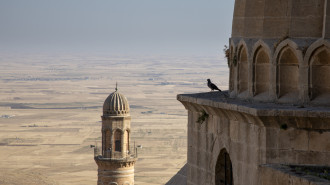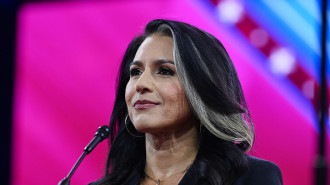'Sisi not welcome' says potential leader of UK Labour
The British politician leading the contest to be opposition leader has said that if he were Britain's prime minister he would not have invited Egyptian President Abdel-Fattah al-Sisi for a state visit to the UK.
In an interview with Middle East Eye, Jeremy Corbyn of the opposition leftist Labour Party said Sisi would not be welcome in the UK because of his human rights record and the imprisonment of former Egyptian president Mohammad Morsi.
"I would not have invited [Sisi] to the UK because of my concerns over the use of the death penalty in Egypt and the treatment of people who were part of the former government of Morsi, which was elected, and the continued imprisonment of President Morsi," he said.
"That's not to give a judgment on the Brotherhood or any other party – it's to give a judgement on what democracy actually means," Corbyn added.
Former army chief turned president Sisi has led a harsh crackdown against Morsi's Muslim Brotherhood since ousting the country's first democratically elected president in a military coup in 2013. Tens of thousands of people have been imprisoned and hundreds sentenced to death in speedy trials roundly condemned by human rights groups.
A spokesperson for British Prime Minister David Cameron recently confirmed the British government was examining the possibility of a visit from Sisi "later this year" to discuss mutual interests. When pressed on Egypt's human rights record, they said the meetings would allow British officials to "raise matters of concern".
More than a thousand people have signed an e-petition calling for the UK to rescind its invitation to Sisi over his poor human rights record.
On Tuesday Corbyn, a veteran left winger, called for former British prime minister Tony Blair to stand trial for war crimes for his role in the invasion of Iraq.
"We went into a war that was catastrophic, that was illegal, that cost us a lot of money, that lost a lot of lives. The consequences are still played out with migrant deaths in the Mediterranean, refugees all over the region," he said in an interview with BBC2's Newsnight.
![Jeremy Corbyn [Getty] Jeremy Corbyn [Getty]](/sites/default/files/styles/large_16_9/public/media/images/7E687AC5-8611-45FA-A9D8-F64D0AD44A71.jpg?h=d1cb525d&itok=ERzOHftn)






 Follow the Middle East's top stories in English at The New Arab on Google News
Follow the Middle East's top stories in English at The New Arab on Google News
![Israel demolished homes in the Silwan area [Getty]](/sites/default/files/styles/image_330x185/public/2024-11/GettyImages-2183868368.jpg?h=199d8c1f&itok=TweR8vd0)

